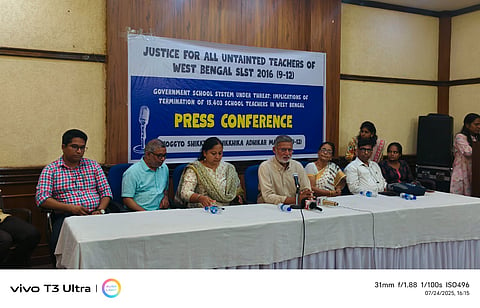
New Delhi- Thousands of school teachers from West Bengal, many of them first-generation educators serving rural and marginalized students, have been forced onto the streets of Delhi after a controversial Calcutta High Court verdict stripped them of their jobs overnight.
Branded as victims of a "systematic dismantling of government schooling" under the National Education Policy (NEP), these teachers are now staging a massive dharna at Ramleela Maidan, demanding justice from the Supreme Court and exposing what academics call a "political conspiracy to privatize education."
"Where will students in rural areas, in small towns, from poor and lower-middle-class backgrounds go?"
"How can the retrenchment of 16,000 innocent teachers be called justice? We ask the Supreme Court."
"Many among us are first-generation teachers who are teaching first-generation learners. Many have taken loans to build a house in the hope of bettering our lives. Are we not entitled to jobs that we earned through massive hard work? Why are we being made scapegoats in the power tussle between the Central and the State Government?"
These are the words of Mahboob Mandal, who teaches at Dosa Chandaneswar High School in a village in the South 24 Parganas district of West Bengal. Mahboob is one among the 16,000 school teachers who, despite being called untainted and incorrupt, have been retrenched from their jobs.
The retrenchments are the result of a disputed verdict of the Calcutta High Court dated April 22, 2024, that invalidated the entire recruitment panel of the 2016 School Service Commission.
This verdict is unprecedented in the way it impacts the livelihood of innocent people, while the corrupt administrative structure remains largely untouched. The verdict is being read as the judiciary's unjust crackdown on innocent school teachers.
It is to be noted that the right to livelihood is implicitly protected by Article 21 of the Indian Constitution. While the corrupt governance of the TMC-run West Bengal Government is a point to be elaborated, the power tussle between the BJP-run Central Government and the TMC at the State level in Bengal is also a factor, as many in the State believe.
Debaditya Bhattacharya, faculty at Jamia Millia Islamia and the author of the acclaimed book The Indian University: A Critical History, said, "School teachers are being punished for corruption done by those sitting in power. No one in the system cares because this goes well with the National Education Policy that prescribes closing down government schools and colleges. Thousands of schools have been closed in UP, Haryana, and Jharkhand."
"This is a direct outcome of a policy regime that has targeted the destruction of publicly funded education in the country. It is the same attitude we see even in our universities, where publicly funded institutions are facing concrete funding cuts in times of increasing inflation," said Gopal Pradhan, Vice President of the AUD Faculty Association.
"This is an assault on working people. We know that government-funded schools are accessible to the children of working-class families, in both rural and urban areas. The attack on government schools is part of the same policy that also imposes the rules of business owners on working people, like the labour codes. These are anti-worker, anti-people policies," said Atul Sood, renowned economist and faculty member at JNU.
"It is the same place where we spoke about the arrest of Ali Khan Mahmudabad because of a Facebook post written with deep academic knowledge about the current polity. The attack on education is real. The present regime is anti-education," said Uma Gupta, faculty at Delhi University and leader of DTI.
The affected teachers are sitting on a dharna at Delhi’s Ramleela Maidan since July 23. The Delhi Police, in a show of force, stopped many of the teachers from attending today’s press conference. Along with physical protests, the teachers have also appealed for a review of the verdict in the Supreme Court.
You can also join our WhatsApp group to get premium and selected news of The Mooknayak on WhatsApp. Click here to join the WhatsApp group.